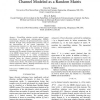Free Online Productivity Tools
i2Speak
i2Symbol
i2OCR
iTex2Img
iWeb2Print
iWeb2Shot
i2Type
iPdf2Split
iPdf2Merge
i2Bopomofo
i2Arabic
i2Style
i2Image
i2PDF
iLatex2Rtf
Sci2ools
JCM
2008
2008
Waterfilling Estimation for AWGN MIMO Channel Modeled as a Random Matrix
Waterfilling solutions provide optimal power distribution in multiple-input multiple-output (MIMO) system design. However, the optimal distribution is usually obtained through costly computational processes, such as the determination of the system eigenvalues. For communication channels in a fast paced environment, the costs are even higher due to the necessity of tracking channel changes. In addition, the computational costs increase with the number of inputs and outputs, i.e. the size of the MIMO channel matrix. A solution for reducing the computational burden is to utilize pre-determined waterfilling based on the channel's statistics. No updates are required unless the channel statistical characteristics change. This work studies waterfilling estimations based on random matrix theory. The results can be applied when the channel coefficients follow a Rayleigh distribution and the noise is additive, white, and Gaussian.
| Added | 13 Dec 2010 |
| Updated | 13 Dec 2010 |
| Type | Journal |
| Year | 2008 |
| Where | JCM |
| Authors | Victor M. Vergara, Silvio E. Barbin, Ramiro Jordan |
Comments (0)

